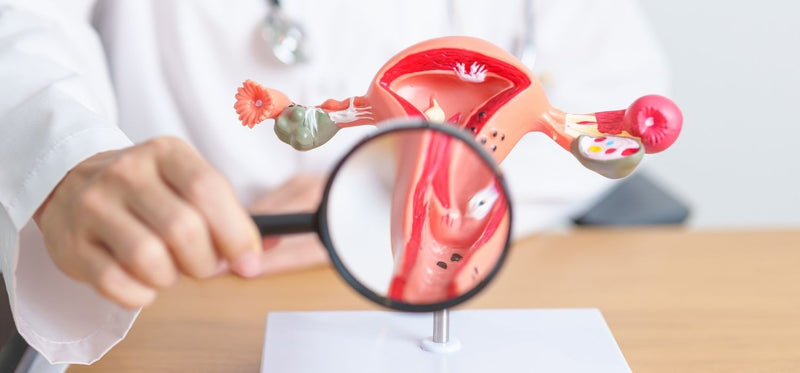
- Fact Checked
- November 27, 2025
- 13 min read
How to Prevent UTIs After Sex: Your Complete Guide to Staying Healthy
Table of Contents
Table of Contents
When you’re ready to get busy in the bedroom, protecting your urinary health is probably the last thing on your mind. But the truth is, urinary tract infections (UTIs) are one of the most common infections women experience every year, and sex is one of the most common triggers.
If you feel like you’re stuck in a cycle of recurring UTIs, your sex life may be the culprit. But don’t worry, you don’t have to swear off sex to stop the burning and frequent urge to go. You just need to incorporate some new daily habits into your routine.
This post is for informational purposes only and does not constitute medical advice. See full disclaimer below.
Understanding the Link Between UTIs and Sex
To prevent UTIs, we must first understand what they are and why they happen.
A urinary tract infection occurs when bacteria (usually E. coli) makes its way into your urethra and begins to multiply, taking over your microbiome and causing infection1. While UTIs aren't a sexually transmitted infection (STI), sexual activity can cause bacteria like E. coli to end up in areas where they don’t belong2.
How? Well, with all the friction of sexual activity, bacteria from the genital area or anus can be pushed toward the urethra and the lower urinary tract. Certain forms of birth control can also increase your risk of UTIs. Contraception methods like diaphragms and spermicide can irritate the urethra or change the bacterial balance in the vaginal area, making it harder for healthy bacteria to fight off harmful E. coli.
Other Risk Factors for UTIs
While sexual activity is one of the most common triggers for UTIs, it's not the only one. Several other factors can increase your risk of developing a urinary tract infection, including:
Anatomy
Unfortunately, women have an anatomy that makes them more prone to UTIs when compared to men. Women have shorter urethras that sit closer to the anus, making it easier for E. coli to travel from the anus into the lower urinary tract. This is why as many as 40% of women experience a UTI in their lifetime, while only 10% of men do.
Hormonal changes
Menopausal and postmenopausal women face a higher risk of UTIs due to lower estrogen levels, which can disrupt the levels of healthy bacteria living in your vagina and urinary tract3. Pregnancy also increases UTI risk as the growing uterus puts pressure on the bladder, making it harder to fully empty, giving bacteria more opportunity to grow4.
Bathroom habits
Holding urine for long periods allows bacteria more time to multiply in the bladder. Similarly, not fully emptying your bladder when you urinate creates an environment where bacteria can thrive.
Lifestyle factors
Wearing wet swimsuits or tight, non-breathable underwear for extended periods creates moisture that bacteria love. Sitting for long stretches (like at a desk job) can also contribute to UTI risk.
Medical conditions
Diabetes, a weakened immune system, catheter use, pelvic organ prolapse, and certain urological conditions or abnormalities all increase your vulnerability to recurrent urinary tract infections5.
Family history
If your mother or sister experiences frequent UTIs, you're more likely to struggle with them as well.
7 Ways to Prevent UTIs After Sex
While recurrent UTIs are as frustrating as they are painful, you can break the cycle, particularly when it comes to UTIs that are triggered by sex. Here are 7 simple ways to improve your urinary tract health, all supported by real data.
1. Urinate Within 15-30 Minutes of Sex
Here's one of the simplest yet most effective ways to prevent UTIs: empty your bladder after sex6. In fact, many healthcare providers and gynecologists call it the single most effective preventive measure for women prone to recurrent UTIs.
Why is this one habit so crucial? Because when you urinate following sexual intercourse, you're essentially flushing out any bacteria that may have been introduced to your urethra before they have a chance to multiply and cause a urinary tract infection.
Make it a trip to the bathroom non-negotiable part of your post-sex routine, even if you don't feel the urge to go. Your urinary system will thank you.
2. Stay Well-Hydrated Throughout the Day
Drinking plenty of water does more than just keep you hydrated. It's one of the most powerful ways to prevent UTIs and support women's health. When you maintain good fluid intake, you naturally urinate more frequently, which continuously flushes bacteria from your urinary system before they can take hold in your urethra or bladder.
Aim for 6-8 glasses of water daily, and consider drinking an extra glass before and after sexual activity. You will know if you are drinking enough by the color of your urine. Well-hydrated urine appears pale yellow or clear, while dark urine signals that you need to drink more.
Bonus tip: limit alcoholic drinks, especially around sexual intercourse. Alcohol can irritate the bladder and may lead to dehydration, which concentrates bacteria in your urinary tract rather than flushing them out.
3. Consider Washing Before And After Sex
Showering before and after sexual activity may seem like overkill, but if you have a history of UTIs, this one habit can significantly reduce your risk of transferring bacteria during sexual activity and help prevent UTIs.
If you can’t take a full shower before or after for whatever reason, consider washing the genital area with warm water and mild soap. Skip scented bubble baths, intimate sprays and soaps, and don't douche. These can irritate sensitive tissue and actually increase the risk of UTIs.
Outside of sex, people with a history of UTIs should also consider showers over baths, as this reduces the risk of bacteria contaminating the bath water and getting into your urethra.
4. Master Your Daily Bathroom Habits
Always wipe from front to back after using the bathroom and after each bowel movement. This sweeps bacteria from the anal area away from the urethra, not toward it. Also, never reuse pieces of toilet paper for multiple wipes or multiple areas. Get a fresh piece of toilet paper each time, and make sure you clean the area thoroughly and completely.
When on your period, consider tampons over pads, as this helps to keep the area drier, and change those tampons every 2-4 hours depending on flow.
5. Choose Breathable, Cotton Underwear
Underwear that is tight or made of non-breathable fabrics like silk or nylon traps moisture and creates an environment where bacteria thrive in the lower urinary tract. Cotton, on the other hand, allows the area to breathe and helps keep it dry.
After sex, you may want to consider changing into new underwear, if possible, and also avoid wearing wet swimsuits or damp workout clothes for extended periods.
6. Take Targeted Supplements
If you're prone to frequent UTIs or recurrent urinary tract infections, the right supplements can provide an extra layer of protection alongside good hygiene and hydration habits. Two of the most studied ingredients when it comes to UTIs are D-Mannose and cranberry7.
D-Mannose
This naturally occurring sugar works by preventing E. coli bacteria from sticking to the walls of your urethra and urinary tract. When bacteria can't attach, they simply get flushed out when you urinate. Research shows D-Mannose supplements can be effective both for treating active UTIs and preventing recurrent urinary tract infections, making it a powerful tool for anyone struggling with frequent infections8.
Cranberry
Cranberry contains compounds called proanthocyanidins that make it harder for bacteria to adhere to urinary tract tissues. While cranberry juice has traditionally been recommended, cranberry supplements are more effective because they deliver concentrated doses without the added sugar found in most cranberry juice. Studies have shown that pure cranberry can help reduce the frequency of recurrent UTIs, especially when combined with other preventive measures9.
Happy V’s D-Mannose + Cranberry
Rather than choosing between two powerhouse ingredients, Happy V combines them into one doctor-formulated and clinically dosed stick pack. These stick packs can travel with you anywhere and have a light strawberry flavor. Take them daily to help prevent recurrent UTIs or just take them after sexual activity to give your urinary tract health a boost when it’s needed most.
7. Consider Changing Your Contraception Method
Diaphrams and spermicides can irritate the urethra and disrupt the natural bacterial balance in your vaginal area, making you more susceptible to UTIs.
If these are your current go-to contraception methods, talk to your healthcare provider or gynecologist about alternative options that may be less likely to increase your risk of urinary tract infections. There are many effective birth control methods available, and finding one that doesn't compromise your urinary health can make a significant difference in breaking the cycle of recurrent UTIs.
Recognizing UTIs Early
While the goal with UTIs is always prevention, the next best thing you can do to protect your urinary health (and your overall urinary comfort) is to recognize the signs of a UTI early so you can seek care before complications arise.
Early common signs of a UTI often include:
- Pain with urination: A burning or stinging sensation when you pee is often the first red flag. This happens because bacteria irritate the lining of your urethra and bladder.
- Urgent, frequent need to urinate: You feel like you constantly need to rush to the bathroom, but only small amounts of urine come out each time. This urgency can be so intense it disrupts your daily activities.
- Cloudy or strong-smelling urine: Healthy urine is typically clear or pale yellow. If yours looks cloudy or has an unusually strong odor, bacteria may be multiplying in your urinary tract.
- Blood in your pee: Seeing pink, red, or cola-colored urine can be alarming. While blood in the urine isn't always present with UTIs, it's a clear sign of irritation or infection in the lower urinary tract.
- Pelvic pressure or discomfort: You might feel pressure, cramping, or aching in your lower abdomen or pelvic area, especially around your bladder.
Any of these signs warrants a call to your doctor. They will likely perform a urine test to confirm infection and get you started with a short course of antibiotics. Whatever they recommend for antibiotics, it's important to take them exactly as prescribed and not stop treatment just because symptoms subside.
While you wait for your appointment, focus on self-care advice that can help alleviate symptoms, like:
- Drinking plenty of water to help flush bacteria from your urinary system
- Applying a heating pad to your lower abdomen to ease cramping and pressure
- Avoiding caffeine, alcohol, and acidic foods that can irritate your bladder
- Taking over-the-counter pain relievers like ibuprofen
- Starting Happy V D-Mannose + Cranberry supplements
Remember to continue to advocate for yourself. If symptoms don't improve with treatment or come back within a few weeks of antibiotics, make another appointment with your doctor.
When to Seek Immediate Medical Care
While early signs of a UTI require action, they are not considered a serious medical issue. Others are.
Sometimes, especially if ignored, a UTI can travel up to the kidneys, leading to a kidney infection known as pyelonephritis. Unlike simple UTIs, complicated UTIs like pyelonephritis are considered urgent, as they can lead to permanent kidney damage or life-threatening sepsis if left untreated.
Go to the emergency room or seek immediate healthcare if you experience:
- High fever (101°F/38.3°C or higher) with chills
- Severe pain in your back, side, or groin
- Nausea and vomiting
- Confusion or mental changes (especially common in older adults)
- Symptoms that worsen rapidly despite treatment
- Signs of sepsis, like rapid heartbeat or breathing and fatigue
Special Considerations for Higher-Risk Groups
While the prevention tips we've given here can help anyone prevent a UTI after sex, certain groups that are at higher risk should take some additional precautions.
Pregnant Women
Be especially diligent about urinating after sexual intercourse and staying well-hydrated. Never ignore UTI symptoms during pregnancy. Untreated UTIs can lead to serious complications, including preterm labor. Contact your healthcare provider at the very first sign of symptoms.
Menopausal and Postmenopausal Women
Lower estrogen levels during and after menopause thin vaginal and urethral tissues, making them more vulnerable to infection. If you are struggling with UTIs when you weren't previously, talk to your healthcare provider about vaginal estrogen therapy (cream, gel, pessary, or ring). Studies show vaginal estrogen can significantly reduce recurrent UTIs in postmenopausal women.
Those with Recurrent UTIs
If you've had three or more UTIs within a year, standard prevention measures may not be enough. Your healthcare provider may recommend:
- Low-dose antibiotic therapy taken after sexual activity or daily
- Longer courses of antibiotics (10-14 days instead of 3-7)
- Urological evaluation to investigate underlying causes like kidney stones or anatomical abnormalities
- Daily D-Mannose + Cranberry supplements for long-term prevention
People with Chronic Medical Conditions
Diabetes, weakened immune system, pelvic organ prolapse, neurological conditions, and catheter use all increase UTI vulnerability. Managing your underlying condition is crucial for prevention. Be proactive about preventive measures and seek prompt treatment at the first sign of symptoms, as UTIs can escalate quickly in immunocompromised individuals.
Remember that whatever puts you at greater risk for recurrent UTIs, these infections are never something you "just have to live with." Chronic UTIs significantly impact quality of life and can lead to serious complications. If your healthcare provider isn't taking your concerns seriously, seek a second opinion or ask for a referral to a urologist who specializes in recurrent urinary tract infections.
Final Thoughts
Preventing UTIs after sex isn’t about giving up intimacy, but giving your body the support it needs to stay healthy. By understanding your personal risk factors and building simple, evidence-backed habits into your routine, you can break the cycle of recurrent infections and regain confidence in your urinary health.
Whether it’s drinking more water, adjusting hygiene habits, rethinking contraception, or adding proven supplements like Happy V’s D-Mannose + Cranberry, small shifts can make a big difference. And if you’re someone who’s dealt with UTIs for years, remember that you’re not alone, and you don’t have to accept constant discomfort as your “normal." With the right knowledge, tools, and support, you can enjoy a worry-free sex life while protecting your urinary tract for the long term.
Keep the Conversation Going
- Visit our blog for more women's health tips.
- Join our private Happy V Facebook group to hear from others who've been there.
- Explore supplements designed to support your vaginal health journey.
Disclaimer: This blog is for informational and educational purposes only and is not intended to diagnose, treat, cure, or prevent any disease. Statements about supplements have not been evaluated by the Food and Drug Administration. For more information about vaginal infections, visit the CDC or speak to a licensed healthcare provider.













